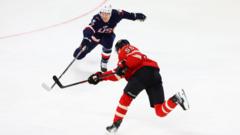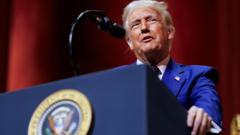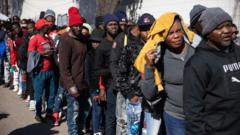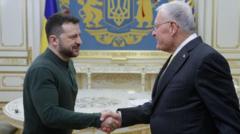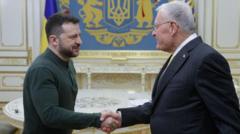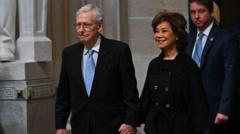In a historic week, U.S. and Russian officials have significantly re-engaged with high-level talks, raising questions about the implications for Europe and Ukraine. While Putin is perceived as gaining diplomatic ground, public opinion in Moscow remains cautious about the potential for lasting peace.
A Diplomatic Shake-Up: Trump and Putin's Week of High-Stakes Engagement

A Diplomatic Shake-Up: Trump and Putin's Week of High-Stakes Engagement
A week of intense dialogue between President Trump and President Putin signals a dramatic shift in U.S.-Russia relations amidst ongoing tensions over Ukraine.
The past week has seen a flurry of diplomatic activity between the United States and Russia, reminiscent of the fervor described by American journalist John Reed during the 1917 Russian Revolution. Unlike Reed's ten-day revolution, the recent events unfolded in a mere week and involved direct communication between Presidents Donald Trump and Vladimir Putin.
The series of interactions began with a pivotal phone call on February 12, followed by discussions at the Munich Security Conference, culminating in high-level talks in Riyadh, marking the first such interaction since the onset of full-scale conflict in Ukraine. This whirlwind of activities has not only updated the scoreboard of global diplomacy but also thrown traditional alliances into disarray, igniting concerns for European security while repositioning Russia as a key player in international politics.
The Russian media, embracing the optics of the Riyadh negotiations, depict the dialogue as a failure for Western efforts to isolate Russia. Publications common in the Kremlinseems to argue that Trump's administration must compromise in negotiations because it is engaging with a nation perceived to be winning the ongoing conflict with Ukraine. Opinions expressed in Russian media highlight a broader narrative of European inadequacies, with one outlet mocking European leaders' confidence as misplaced.
Public sentiment in Russia appears mixed; some citizens express skepticism about the new rapport, with individuals like Nadezhda pointing out that Trump's priorities may not lead to any meaningful change. Many Russians are watching closely, hoping for signs that peace could emerge from these engagements, despite the ongoing economic strains exacerbated by the conflict and sanctions.
While Trump and Putin's verbal exchanges symbolize a thaw in relations, citizens remain apprehensive. Recent fairy-tale-like imaginations in local papers envision their conversations as flippant discussions about world divisions, indicating that the public is not wholly convinced of the diplomatic depth behind these gestures.
With a presidential summit anticipated, the world weighs the possibility of a new chapter in U.S.-Russia relations. However, doubts linger regarding whether this renewed outreach can lead to anything more than temporary gains, both politically and economically, for the involved nations and the global community. In this intricate dance between diplomacy and power, only time will reveal the true impact of this week's actions.
The series of interactions began with a pivotal phone call on February 12, followed by discussions at the Munich Security Conference, culminating in high-level talks in Riyadh, marking the first such interaction since the onset of full-scale conflict in Ukraine. This whirlwind of activities has not only updated the scoreboard of global diplomacy but also thrown traditional alliances into disarray, igniting concerns for European security while repositioning Russia as a key player in international politics.
The Russian media, embracing the optics of the Riyadh negotiations, depict the dialogue as a failure for Western efforts to isolate Russia. Publications common in the Kremlinseems to argue that Trump's administration must compromise in negotiations because it is engaging with a nation perceived to be winning the ongoing conflict with Ukraine. Opinions expressed in Russian media highlight a broader narrative of European inadequacies, with one outlet mocking European leaders' confidence as misplaced.
Public sentiment in Russia appears mixed; some citizens express skepticism about the new rapport, with individuals like Nadezhda pointing out that Trump's priorities may not lead to any meaningful change. Many Russians are watching closely, hoping for signs that peace could emerge from these engagements, despite the ongoing economic strains exacerbated by the conflict and sanctions.
While Trump and Putin's verbal exchanges symbolize a thaw in relations, citizens remain apprehensive. Recent fairy-tale-like imaginations in local papers envision their conversations as flippant discussions about world divisions, indicating that the public is not wholly convinced of the diplomatic depth behind these gestures.
With a presidential summit anticipated, the world weighs the possibility of a new chapter in U.S.-Russia relations. However, doubts linger regarding whether this renewed outreach can lead to anything more than temporary gains, both politically and economically, for the involved nations and the global community. In this intricate dance between diplomacy and power, only time will reveal the true impact of this week's actions.

